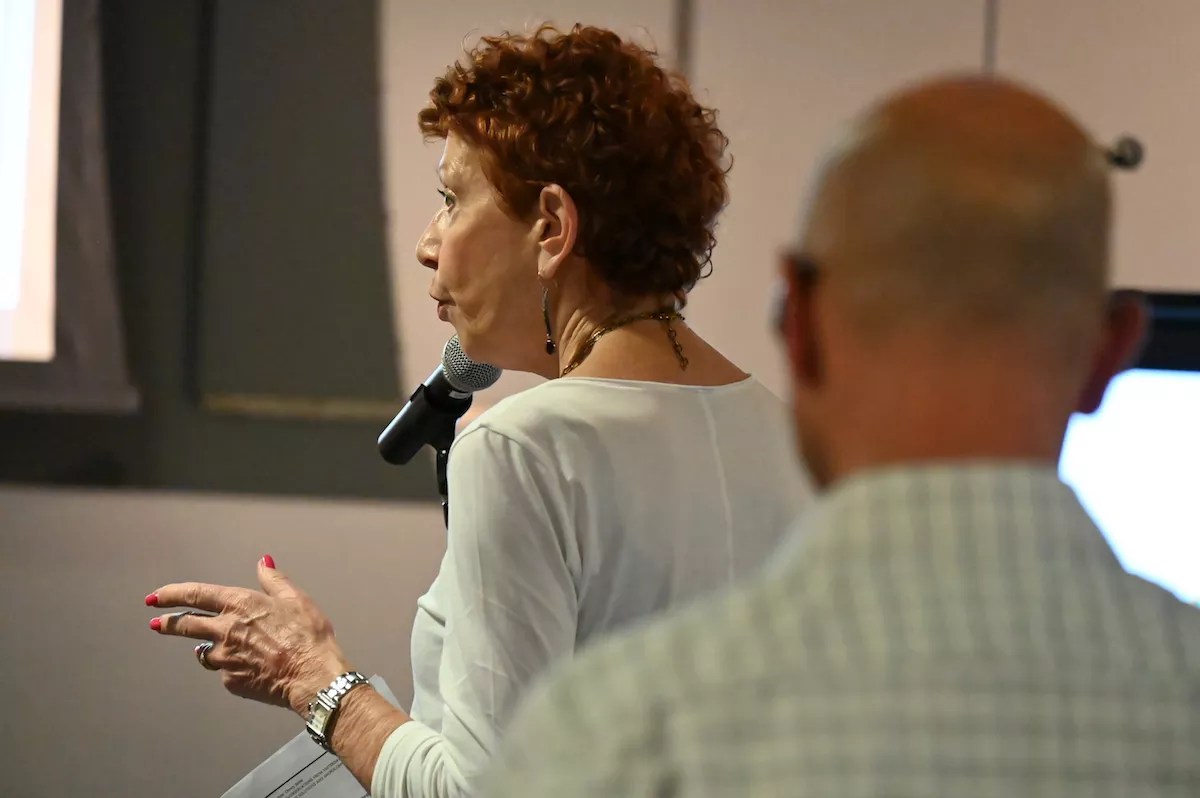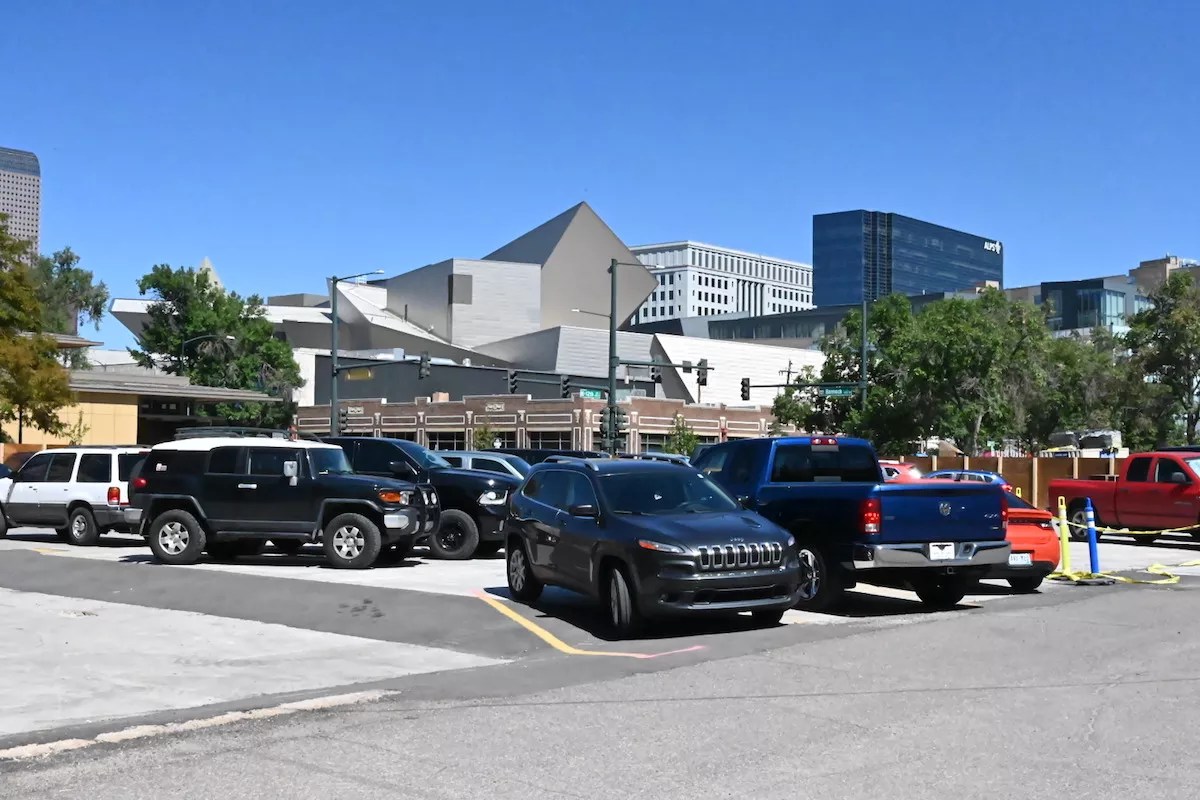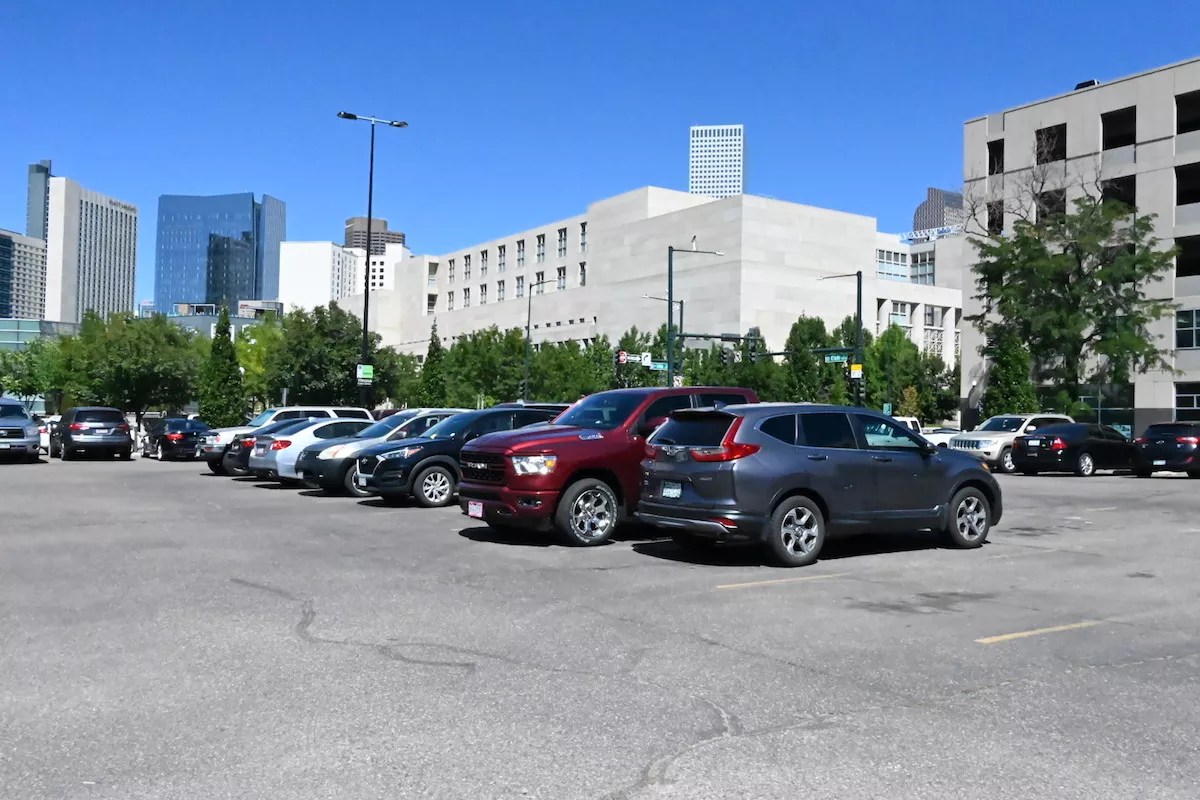
Bennito L. Kelty

Audio By Carbonatix
Mayor Mike Johnston doesn’t have to look far for critics of his homeless housing plan.
Just outside his office, the neighbors and business owners of the Golden Triangle Creative District in Denver’s Civic Center neighborhood are skeptical about hosting two of his micro-communities in the area.
Lisa Beauchamp, co-chair of the district, says her neighborhood “feels like they weren’t being heard,” and one of the most common complaints from residents is that their community is being dealt an undue burden.
“There’s no reason to concentrate them in our area,” Natalie Janzen, a Golden Triangle resident for five years, tells Westword. “We have compassion for the people that are struggling, and I want them to be able to get help, but there’s some accountability.”
Beauchamp, who’s been living in the area for four years, adds: “There’s no district that’s having two inside one neighborhood. So we’re a little unique to what’s taking place.”
Denver’s Civic Center neighborhood and the Golden Triangle Creative District are home to a mix of government buildings, popular museums, hotels, chic cafes, restaurants and brick warehouses converted to apartments and offices. Johnston announced on August 25 that the area would also host two of his eleven planned micro-communities – places where homeless people can live in small indoor spaces that are supervised, offer trash pickup and are equipped with bathrooms.
Golden Triangle residents spoke up at a community meeting held on September 1 at the McNichols Civic Center Building, with many feeling as though their community is starting to take on more than its fair share of responsibility for helping Denver, as it already hosts a women’s shelter and a jail.
“The Golden Triangle might feel that they’ve done their part in hosting the less fortunate among us,” said David Sorrick, a resident and property owner in the area since 1992, at the meeting. “My concern is, are we getting more than our fair share?”
Johnston’s micro-communities, also known as tiny homes, are one type of housing that the mayor plans to use to shelter 1,000 people by the end of the year, along with existing units and converted hotels and commercial buildings.

The future site of one of Mayor Mike Johnston’s micro-communities is at 1199 Bannock Street, near several popular businesses and museums in the Golden Triangle.
Bennito L. Kelty
When Johnston unveiled his planned micro-community sites, he insisted that the city was “intentional about making sure we have an equitable map” and that the distribution of sites “represents all regions.”
“We’re purging our neighborhood of certain things right now,” Beauchamp says. “We’re just so filled to be able to have two. We don’t have a tax district that pays for some of it, so where are the funds coming from? What’s going to help our neighborhood be able to survive some of those things?”
The Golden Triangle is a state-certified creative district, which Beauchamp describes as “just like a sponsorship and not a tax dollar.” Ultimately, “all it allows us to be able to do is we carry a certification,” she explains. “It can help in getting funding to bring artists or musicians. It can help us bring in those things to support the arts.”
In 2016, Colorado certified Colfax Avenue, Broadway and Speer Boulevard as the boundaries of the Golden Triangle Creative District. The area has more than 500 businesses and institutions and more than 4,000 residents, according to the U.S. Census. The GTCD is run almost entirely by volunteers.
Mayor Johnston plans to unveil more sites in the near future and wants to eventually begin moving people off the streets and into shelters sometime in November or December. But so far, the Golden Triangle is the only place slated to hold at least two micro-communities, which Beauchamp says was a complete shock.
“It was not only the surprise that there would be two, but I thought that there would be more communication,” Beauchamp says. “We’re not opposed to having a tiny home community inside our community. We’re just concerned that we’re taking on too much for what we currently have.”
The mayor never offered an explanation to the GTCD as to why it plans to place two micro-communities in the district, Beauchamp says. One will be at the parking lot on 1375 North Elati Street, across the street from the Lindsey-Flanigan Courthouse and the Denver AID Center; the other will be at 1199 Bannock Street, near businesses like the Kirkland Museum, Leven Deli and Dulce Vida.
Real estate developer Urban Villages owns the 1199 Bannock Street property and plans to build an apartment building there, a spokesperson for the company tells Westword. However, it has only been in “early discussions” with the City of Denver.
“Urban Villages is in early discussions with the city for including the property as a part of their strategy to house 1,000 individuals by end of year,” the company said in a statement. “We recognize this important challenge of housing people experiencing homelessness in our city and are looking forward to continuing discussions with the city and the broader community to determine if the site is suitable for the city’s needs and can be a part of the solution.”
Beauchamp narrowed down the concerns from Golden Triangle residents to a lack of communication from the mayor’s office; security at the micro-communities; how the sites might affect traffic in an area that already deals with constant construction; and “our cultural institutions that are right there,” she says.
“What is that going to do to the people who are coming from other parts of the city and other parts of the world?” she asks.

A micro-community site is planned for the area that’s currently a parking lot at 1375 Elati Street, across from the Lindsey-Flanigan Courthouse.
Bennito L. Kelty
At the community meeting, Golden Triangle resident Elaine Kamm noted how she’s worried that tourism in Denver will take a hit by putting “a [micro-community] site right at the center of the cultural gem of a city, where we’re attracting people from all over the country, even all over the world, to come to this area to spend.
“I hope the [Denver Art] Museum basically says no, you can’t do this,” she explains. “To have this right at its doorstep.”
“Being an arts districts and what we’ve done in the past such as having the jail and other services available in our neighborhood, we’ve done more than our fair share,” said Janzen. “I feel like we’ve done a lot.”
Added Kamm: “This neighborhood has been so stressed. We’ve taken on a lot. We’re getting used to the high-rises. I don’t know about how concerned other people are about all the people that will be here and the [sun]light that we’re losing.” For years, the Golden Triangle has also had its fair share of homeless people camping and passing through. Residents are skeptical about whether micro-communities are a good idea at all.
“What is the difference between people doing drugs and prostitution in tents and in tiny homes?” resident Brent Snyder asked at the Friday meeting. “I don’t understand, because to me if you don’t have property that is completely secure, with limited access, 24-hour security, you’re going to have the same problem.”
Speaking to Westword, Janzen says: “We have an issue anyway with a lot of drug abuse on our streets and the immediate surroundings. If the idea is to take these people off the streets and give them a home and hope that they take advantage of any services available, I think we might be a little naive about how difficult that is for some people.”
Mayor Johnston and City Councilman Chris Hinds, of District 10, have a town hall scheduled with the GTCD on September 28 at the Evans School on 1115 North Acoma Street at 5 p.m., which is part of a series of town halls to hear from neighbors about Johnston’s plan.
Hinds, who represents the Golden Triangle, “is committed to working with everyone to put together an agreement that works for everyone,” an aide from his office says. “These are issues he cares about deeply.”
GTCD held their community meeting last week, despite the mayor’s office asking them to wait until the town hall later in the month, according to Beauchamp – who insists she’s “absolutely not” upset with Johnston.
“It goes back to the communication,” she says. “Let’s sit down and let’s come up with solutions to be able to resolve everybody’s concerns.”